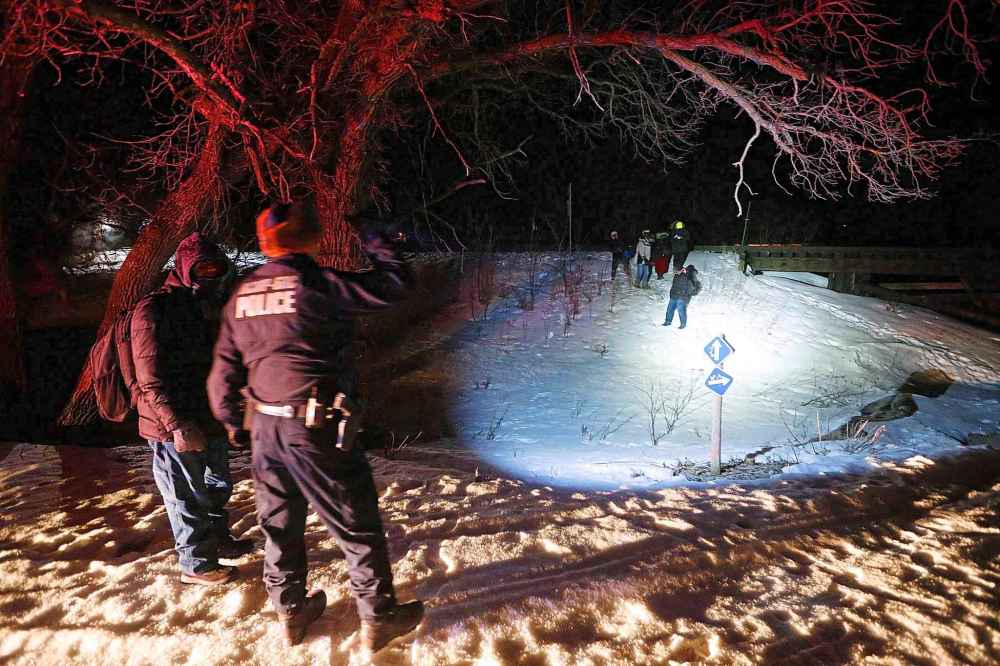Legal Aid still burdened by rush of asylum seekers
Read this article for free:
or
Already have an account? Log in here »
To continue reading, please subscribe:
Monthly Digital Subscription
$19 $0 for the first 4 weeks*
- Enjoy unlimited reading on winnipegfreepress.com
- Read the E-Edition, our digital replica newspaper
- Access News Break, our award-winning app
- Play interactive puzzles
*No charge for 4 weeks then billed as $19 every four weeks (new subscribers and qualified returning subscribers only). Cancel anytime.
Read unlimited articles for free today:
or
Already have an account? Log in here »
Hey there, time traveller!
This article was published 18/02/2019 (1887 days ago), so information in it may no longer be current.
Two winters ago, undeterred by frigid temperatures, the threat of frostbite or uncertainty for their future, waves of asylum seekers walked across the U.S. border into Manitoba. They crossed the border in unprecedented numbers, many of them members of Minnesota’s Somali community who headed north after U.S. President Donald Trump proposed a so-called ban on migrants from Muslim countries.
Two years later, Manitoba’s legal community is still feeling the ripple effects of those refugee claims — and some of those refugee claimants could still be in limbo.
The influx of asylum seekers disproportionately affected Manitoba — this province saw a 493 per cent increase in asylum claims processed by the Canada Border Services Agency in 2017 over the previous year, compared to a 119 per cent increase in Quebec — and it has since slowed to a trickle. Only one asylum seeker was intercepted by RCMP in Manitoba so far this year.
Legal Aid Manitoba has described the influx in asylum seekers and their resulting refugee claims as one of its most "significant pressures." In its most recent annual report, published in November 2018, Legal Aid cited a 305 per cent increase in the number of immigration and refugee applications it received in 2016-2017. That number is now on the decline, but lawyers have traced that spike in requests for legal help back to the "Trump effect."
!function(e,t,s,i){var n=”InfogramEmbeds”,o=e.getElementsByTagName(“script”)[0],d=/^http:/.test(e.location)?”http:”:”https:”;if(/^/{2}/.test(i)&&(i=d+i),window[n]&&window[n].initialized)window[n].process&&window[n].process();else if(!e.getElementById(s)){var r=e.createElement(“script”);r.async=1,r.id=s,r.src=i,o.parentNode.insertBefore(r,o)}}(document,0,”infogram-async”,”https://e.infogram.com/js/dist/embed-loader-min.js”);
"I don’t see any other cause for this precipitous movement other than the Trump effect," said senior Winnipeg immigration lawyer David Matas, former chair of the Canadian Bar Association’s immigration law section. Even after Prime Minister Justin Trudeau tweeted a welcoming message to prospective refugees in late January 2017, it wasn’t Trudeau’s comments Matas’s clients asked about — it was Trump’s.
As a result, the Immigration and Refugee Board of Canada was swamped with refugee claimants. The board pushed back its own deadlines because of the unprecedented influx of claims, no longer able to hold hearings within 60 days or decide appeals within 90 days. But, Matas said, the board enforced existing timelines for refugee claimants and their lawyers. In the midst of a spike in claims that put a strain on the handful of lawyers in Manitoba who specialize in refugee hearings, Matas said the board would refuse to grant time extensions and would dismiss claims because of missed timelines.
"Many of these people who’ve been rushed through the system unfairly are still around and still trying to deal with their cases," he said. "In my view, we need to unravel all of the rush that occurred, at least for the people that still are here, do things in a proper, orderly fashion."

Some of those people, many of whom are of Somali origin, have remained in Canada without status even though their claims were denied, Matas said, and some are awaiting appeals from the Federal Court.
Immigration and Refugee Board of Canada spokesperson Melissa Anderson said Tuesday she hadn’t heard any such concerns. The board couldn’t provide Manitoba-specific statistics on the number of claims that have been resolved, nor any data on the number dismissed due to time constraints. There’s currently a 24-month wait for new hearings, and Anderson said it’s up to individual adjudicators to decide whether to grant time extensions.
"I’m certainly aware that everybody involved in the system is under a lot of pressure right now due to the volume of claims. That includes the IRB, and there are many initiatives in place to get more claims resolved," Anderson said, adding the IRB no longer requires hearings for certain refugee claims that are not complex. The board hasn’t made a decision on a Legal Aid Manitoba proposal that suggested allowing non-lawyers to be paid to prepare the refugee claim forms.
Legal Aid Manitoba chairman Tim Valgardson said the government-funded organization is "making it work" with a limited budget as immigration and refugee cases start to decrease. Legal Aid handled 624 of those cases as of Feb. 15, down from its peak of 939 cases the previous fiscal year.
!function(e,t,s,i){var n=”InfogramEmbeds”,o=e.getElementsByTagName(“script”)[0],d=/^http:/.test(e.location)?”http:”:”https:”;if(/^/{2}/.test(i)&&(i=d+i),window[n]&&window[n].initialized)window[n].process&&window[n].process();else if(!e.getElementById(s)){var r=e.createElement(“script”);r.async=1,r.id=s,r.src=i,o.parentNode.insertBefore(r,o)}}(document,0,”infogram-async”,”https://e.infogram.com/js/dist/embed-loader-min.js”);
"Of course we’re still feeling the effects of it," he said of the influx. "So it’s still a significant amount of pressure on Legal Aid and Legal Aid’s budget."
The Canada Border Services Agency, which has been active in handling claims at the Emerson, Man., border crossing, declined an interview request. In a statement, CBSA said officers at the Emerson port are well-trained and experienced in handling asylum seekers.
In the meantime, Matas said Manitoba has been "overwhelmed and then overlooked" by the institutions that process refugee claims for the government — including the IRB, which doesn’t have a Manitoba office.
"The system has reacted unevenly. There’s certainly been delays in processing, but the delays have been basically to convenience the administrators and not to address the problems that the claimants themselves face because of the influx," he said.
"We haven’t given the welcome we really are capable of and should because of these tight deadlines and the inflexibility of dealing with them and the unwillingness to face the reality of the situation in dealing with the numbers that we have."
katie.may@freepress.mb.ca
Twitter: @thatkatiemay

Katie May
Reporter
Katie May is a general-assignment reporter for the Free Press.










